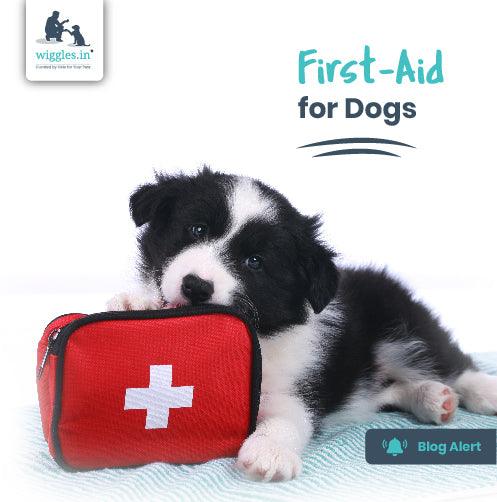Being a pet parent takes a lot of hard work, dedication and loads of love to raise your pet the right way. In other words, it is equivalent to raising your own child but in this case they woof a lot! Pets do come with a lot of responsibilities but you wouldn’t exchange it for the world, right?
If they can take care of our physical and mental being, then we can definitely take care of theirs. There are a few medical necessities which need to be fulfilled once you turn into a pet parent. Various behavioral aspects which are crucial during their growing period should also be taken into account. But the most important part of being a pet parent is to be prepared for any medical emergency.
Such an emergency calls for vigilance and early preparedness. How to do that? By having a First-Aid kit ready 24x7 exclusively for your baby!
Why is First-Aid important?
There are a few major medical conditions which are common in nature and can occur often in dogs. These medical emergencies can be treated easily at home by any pet parent provided they have enough knowledge about them. Therefore, every pet parent should have a comprehensive first-aid medical kit ready at all times. This will allow them to give first hand treatment in case a vet is unavailable. Just like humans, a first-aid medical kit is essential for dogs as well.
What should it contain?
A first-aid kit should contain all the major medicines which can be given at times of medical emergencies. Now the medical emergencies can vary from one dog to another. Few medical emergencies that can come up are maggot wounds, ticks, fleas, weakness, itching, minor cuts and bruises. All of them can be treated with a readily available first-aid kit.
The first-aid kit should ideally contain the following items -
Instruments
- Digital Thermometer - It is extremely important to have a digital thermometer ready in your dog’s first-aid kit. It is recommended that a separate thermometer be used for them. It should be clearly marked and indicated and kept separately from your thermometer
- Latex gloves - These will ensure safety and hygiene of your pet.
- Bandage Tape - If there is any wound which needs to be covered then a bandage tape can come handy.
- Cotton - In order to clean the wound with an antiseptic.
- Surgical Scissors - To cut bandages and should be sterilized before and after treating a wound.
- Tweezers - If there is any tick on your pet’s body, a tweezer is the right instrument to get rid of them. These also need to be sanitized before and after every use.
- Muzzle - Also known as the “Cone of Shame”, to restrain your dog from licking any wounded area.
Medicines
2. Other options can be Himax cream and Negasunt powder which can be bought from any vet or pet supply store.
3. To avoid any infestation of bacteria and germs, Neosporin Antibiotic Powder should be kept handy.
4. Your first-aid will be incomplete without an anti-diarrheal medicine, an antacid and an anti-emetic (for vomiting). But be sure to consult with your vet before giving the medicines.
5. Another option can be Topicure spray which is a natural spray with ayurvedic components. It can be used for deep seated wounds in order to avoid any further infections. Wiggles’ Wound Healing Spray is also an effective product to heal wounds.
6. Ticks and fleas are most common in dogs. In order to tackle them, Fipronil spray can be used effectively. Another great option is the Wiggles’ Ravtix Anti-Tick Spray.
7. Your first-aid kit should also accommodate some multivitamins like Neurobion in order to maintain the overall health of your pet. Wiggles’ Immunity Booster is also a great option to develop immunity in pets.
8. Itching is another commonly found ailment in dogs. If it is aggressive itching then Avil can be used to give them some relief after consulting with the doctor.
9.Although not so common like the ailments mentioned above, itching in eyes can also be troublesome to your pets. To cure this, a good eye drop should be kept as well.
It is also suggested that pet parents take due suggestions from their vets regarding the dosage of their pets. Each pet is different and that demands a different dose. It also depends on various factors like age, weight, present ailments, surgeries etc. Medicines are meant to cure their problems but excess of anything is bad. Pet parents should remain vigilant when it comes to dosage as medicines might end up causing more trouble instead of curing them.
There might also be situations where the severity is high. In such cases, pet parents need to take their pets to the vets immediately. Cases like poisoning, fractured bones, severe insect/bee sting, heat stroke or seizures can lead to dangerous consequences. It is best advised that such cases should be handled swiftly without wasting any time.
How to manage the behavior of dogs/pets in case of an injury-
Dogs can’t speak. They can’t communicate their pain to us. They can only whimper and hope that we understand. As pet parents, this might be a tricky situation but with love and care, this can be easily overcome.
If your pet is stressed and behaving unusually, stay with him. Don’t leave them alone. Pet them and stay as close as possible. To understand your pet’s needs, you need to build communication with them. Start early and you will eventually come to understand the unsaid.
At the end of the day, your pet is like your kid. In fact, they are your kids. Make sure to treat them like one!



















